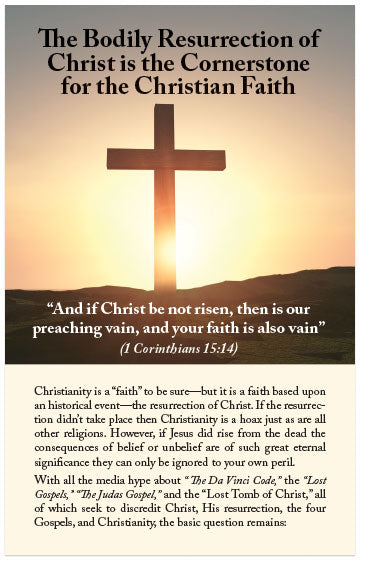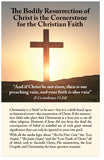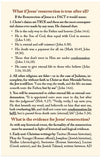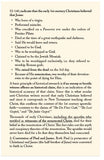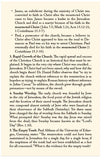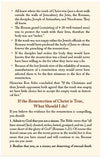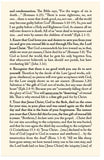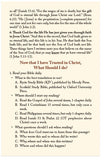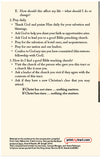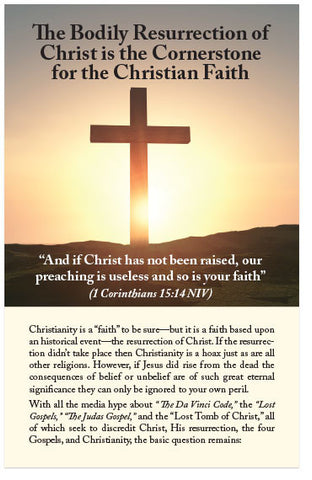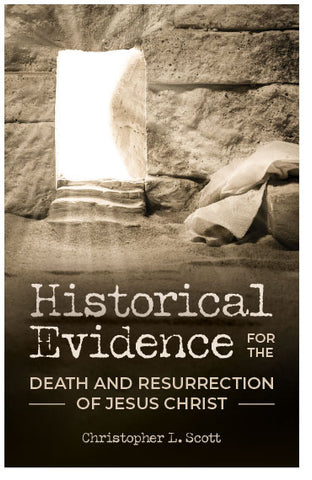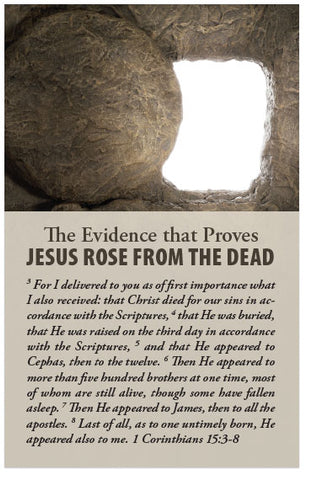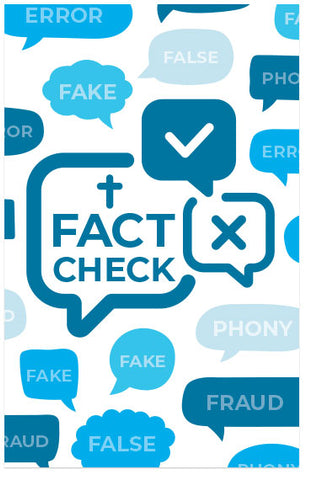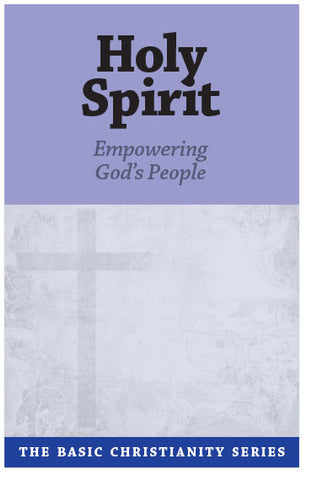The Bodily Resurrection of Christ (KJV)
Special-Order Folded Tract
 NOTE: This item is custom-printed to order (click for more details).
NOTE: This item is custom-printed to order (click for more details).
This tract is from our print-on-demand library, and is not kept in stock. Select the options below, and we will custom-print a batch just for you. Because this item is custom-printed, you can add your custom imprint to the back page at no extra cost.
- Estimated shipping date: Tuesday, March 17 (Click for more details)
- SKU:
- Discounts: Discount coupons do not apply to this item
- Format: Folded Tract
- Size: 3.5 inches x 5.5 inches
- Pages: 8
- Imprinting: Available with 5 lines of custom text
- Version: KJV
- Returns: Because this item is custom-printed to order, it cannot be returned.
Show all item details
The full text of this tract is shown below in the KJV version. (Do you want to print this tract in a different version than the one listed? Contact us and let us know what you're looking for—we may be able to create the alternate version for you at no charge.)
“And if Christ be not risen, then is our preaching vain, and your faith is also vain” (1 Corinthians 15:14)
Christianity is a “faith” to be sure—but it is a faith based upon an historical event—the resurrection of Christ. If the resurrection didn’t take place then Christianity is a hoax just as are all other religions. However, if Jesus did rise from the dead the consequences of belief or unbelief are of such great eternal significance they can only be ignored to your own peril.
With all the media hype about “ The Da Vinci Code,” the “Lost Gospels,” “The Judas Gospel,” and the “Lost Tomb of Christ,” all of which seek to discredit Christ, His resurrection, the four Gospels, and Christianity, the basic question remains:
What if Jesus’ resurrection is true after all?
If the Resurrection of Jesus is a FACT it would mean:
1. Christ’s claims are TRUE and these are the most consequential claims ever made by any man. He claimed that:
He is the only way to the Father and heaven (John 14.6).
He is the Son of God, thus equal with God in essence (John 5.18).
He is eternal and self-existent (John 8.58).
His death was a payment for all sin (Mark 10.45; John 19.30).
Those that don’t trust in Him are under condemnation (John 3.16,18).
He came to give eternal life to those who believe (John 3.16; 10.28).
2. All other religions are false—or in the case of Judaism, incomplete, for without faith in Christ as their Messiah/Savior, the Jew is still lost. “I am the way, the truth, and the life: no man cometh unto the Father, but by me” (John 14.6).
3. You will be resurrected to either eternal life or eternal condemnation. “It is appointed unto men once to die, but after this the judgment” (Heb. 9.27). “Verily, verily, I say unto you, He that heareth my word, and believeth on him that sent me, hath everlasting life, and shall not come into condemnation [in hell]; but is passed from death unto [eternal] life” (John 5.24).
What is the evidence for Jesus’ resurrection?
As with any historical event, the factuality of the resurrection must be assessed in light of historical and logical evidence.
1. Early anti-Christian writings by: Tacitus (Roman historian), Pliny the Younger (Roman official), Josephus (Jewish historian), Thallus (chronologist), Suetonius (Roman historian), Lucian (Greek satirist), and the Jewish Talmud, written between AD 52-140, indicate that the early 1st century Christians believed that Jesus:
• Was born of a virgin.
• Performed miracles.
• Was crucified on a Passover eve under the orders of Pontius Pilate.
• Died at the time of a great earthquake and darkness.
• Said He would leave and return.
• Claimed to be God.
• Was to be worshipped as God.
• Claimed to be the Jewish Messiah.
• Was to be worshipped exclusively, i.e. they refused to worship Roman gods.
• Was raised from the dead on the 3rd day.
• Because of His resurrection, was worthy of their devotion-even to the point of dying for Him.
A basic principle of historical research is if an enemy or hostile witness affirms an historical claim, this is an indication of the historical accuracy of that claim. Since this is what secular anti-Christian writers record that early Christians believed and since it corresponds to New Testament teaching about Christ, this confirms the content of the 1st century apostolic faith—contrary to the claims of “The Da Vinci Code,” “The Lost Gospels,” and “The Judas Gospel.”
Thousands of early Christians, including the apostles who testified as witnesses of the resurrected Christ, died for their belief in the resurrection of Christ. This fact rules out the myth and conspiracy theories of the resurrection. The apostles would never have died for a lie that they themselves had concocted.
2. Conversion of Paul and James. Both Paul (a persecutor of Christians) and James (the half-brother of Jesus) were converted to faith in Christ.
James, an unbeliever during the ministry of Christ was converted to faith in Christ after the resurrected Christ came to him. James became a leader in the Jerusalem Church and died as a martyr because of his faith in the resurrected Christ (John 7.5; Mark 3.21; Acts 15.12-21; 1 Corinthians 15.3-7).
Paul, a persecutor of the church, became a believer in Christ after Christ appeared to him on the road to Damascus as Paul was on his way to arrest Christians. Paul eventually died for his faith in the resurrected Christ (1 Corinthians 15.3-10).
3. Rapid Growth of the Church. The rapid spread and success of the Christian Church is an historical fact that must be explained. It began in the very city where Christ was crucified…Jerusalem. If Christ had not been raised, why and how did the church begin there? Dr. Daniel Fuller observes that “to try to explain the church without reference to the resurrection is as hopeless as trying to explain Roman history without reference to Julius Caesar.” In addition, the church grew through gentle persuasion—not by means of the sword.
4. Sunday Worship. The early church was founded by Jews in the city of Jerusalem, the focal point of the Jewish religion and the location of their sacred temple. The Jerusalem church was composed almost entirely of Jews who were fanatical in their observance of the Sabbath (Saturday). Yet these same Jews changed the day of worship from the Sabbath to Sunday. What prompted this? Sunday was the day Jesus was raised from the dead, thus Sunday became known as the “Lord’s Day” (Rev. 1.10).
5. The Empty Tomb. Paul Althaus of the University of Erlangen, Germany, states: “The resurrection could not have been maintained in Jerusalem for a single day, for a single hour, if the emptiness of the tomb had not been established as a fact for all concerned.” What is the evidence for the empty tomb?
All knew where the tomb of Christ was (just a short walk outside the walls of Jerusalem); the Jews, the Romans, the disciples, Joseph of Arimathea, and Nicodemus. They all knew.
The Roman guard (consisting of 4-20 well-trained men) was to protect the tomb with their lives, therefore the body was not “stolen.”
If the tomb was not empty either the Jewish officials or the Romans would have produced the body of Jesus to silence forever the preaching of the resurrection.
If the disciples had stolen the body they would have known that the resurrection was a fraud and would never have been willing to die for what they knew was a lie.
Because of the low Jewish view of the reliability of women, manufacturers of a resurrection story would never have selected them to be the first witnesses to the fact of the resurrection.
Historian Ron Sider concluded that: “If the Christians and their Jewish opponents both agreed that the tomb was empty, we have little choice but to accept the empty tomb as historical fact.”
If the Resurrection of Christ is True, What Should I do?
If you believe the evidence for the resurrection is compelling, you should:
1. Admit to God that you are a sinner. The Bible states that “all have sinned [lied, cheated, stolen, lusted, gossiped, and etc.], and come short of the glory of God” (Romans 3.23). Of course this doesn’t mean you are the worst person in the world, but it does mean that you have sinned and will continue to sin. Because you sin you must:
2. Realize that you, as a sinner, are deserving of eternal death and condemnation. The Bible says, “For the wages of sin is death…” (Romans 6.23). “There is none righteous, no, not one…there is none that doeth good, no, not one…all the world may become guilty before God” (Romans 3.10-19). So, you and I are guilty before a Holy and Righteous God. As sinners all we will ever deserve is death. All of us “were dead in trespasses and sins…and were by nature the children of wrath” (Eph 2.1-3).
3. Know that God loves you and desires to save you from your sin and give you eternal life in and through His Son, the Lord Jesus Christ. “But God commendeth his love toward us, in that, while we were yet sinners, Christ died for us” (Romans 5.8). “For God so loved the world, that he gave his only begotten Son, that whosoever believeth in him should not perish, but have everlasting life” (John 3.16).
4. Recognize that there is no good work you can do to save yourself. Therefore by the deeds of the Law [good works, religious obedience] no person will ever gain acceptance with God, for the Law simply shows us we are sinners. (Romans 3.20) Salvation is “the gift of God: not of works, lest any man should boast” (Eph 2.8-9). Because you are “constantly falling short of the glory of God.” You will never ever be “deserving” of eternal life. That is why eternal life is a free gift paid for by Christ.
5. Trust that Jesus Christ, God in the flesh, died on the cross for your sins, in your place and was raised again on the third day and that this is the basis of your forgiveness. The instant you trust that Christ did this for you, the free gift of eternal life is yours. “Brethren, I declare unto you the gospel…Christ died for our sins according to the scriptures; and that he was buried, and that he rose again the third day according to the scriptures” (1 Corinthians 15.1-4). “Jesus Christ…[was] declared to be the Son of God [equal to God in essence and attributes]… by the resurrection from the dead” (Rom. 1.3-4). “All we like sheep have gone astray; we have turned every one to his own way; and the Lord hath laid on him [Jesus Christ] the iniquity [sins] of us all” (Isaiah 53.6). “For the wages of sin is death; but the gift of God is eternal life through Jesus Christ our Lord.” (Rom. 6.23). “He [Jesus] is the propitiation [complete payment] for our sins: and not for ours only, but also for the sins of the whole world” (1 John 2.2).
6. Thank God for the life He has just given you through faith in Jesus Christ. “And this is the record, that God hath given to us eternal life, and this life is in his Son. He that hath the Son hath life; and he that hath not the Son of God hath not life. These things have I written unto you that believe on the name of the Son of God; that ye may know that ye have eternal life” (1 John 5.11-13).
Now that I have Trusted in Christ, What Should I do?
1. Read your Bible daily.
What is the best translation to use?
• Ryrie Study Bible (KJV), published by Moody Press.
• Scofield Study Bible, published by Oxford University Press.
Where should I start my reading?
• Read the Gospel of John several times, 1 chapter daily.
• Read 1 Corinthians 15 several times, but only once a week.
• Read Philippians several times, but only 1 chapter daily.
• Read Isaiah 53 & Psalm 22 (OT prophecies about Christ) once a week.
What questions should I ask when reading?
• What does God want me to learn from this passage?
• Who wrote this and to whom did he write?
• Why, where and when was this written?
• Where and when did this happen?
• How should this affect my life – what should I do or change?
2. Pray daily.
• Thank God and praise Him daily for your salvation and blessings.
• Ask God to help you share your faith as opportunities arise.
• Ask God to lead you to a good Bible preaching church.
• Pray for the salvation of loved ones, and acquaintances.
• Pray for our nation and our leaders.
• Confess to God any sins you have committed (this restores fellowship with God).
3. How do I find a good Bible teaching church?
• Visit the church of the person who gave you this tract or a church like it near you.
• Ask a leader of the church you visit if they agree with the contents of this tract.
• Ask if they have a new Christian’s class that you may attend.
If Christ has not risen … nothing matters.
If Christ has risen … nothing else matters.

